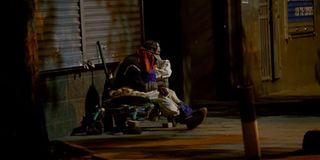While Covid-19 remains lethal, curfew is not a shield

A night guard at a Nairobi street CBD on May 5, 2020. Kenya imposed a dusk to dawn curfew to curb the spread of coronavirus.
What you need to know:
- The President banned political gatherings and demanded that other leaders step forward to uphold this.
Burials are incomplete unless politicians have spoken.
Masks are barely worn at these rallies and funerals.
In the coming days, President Uhuru Kenyatta will be addressing the country on the state of Covid-19 and announce new measures the government will be effecting to respond to the severity of the pandemic it considers to be a threat to the lives of those living within the country’s borders. Whatever those measures are, most Kenyans want to see the curfew lifted.
This is not to suggest that Covid-19 has stopped being a deadly adversary to those it infects.
It may have moved off the front pages and top-of-the-news prime positions but it continues to kill and infect. There are eerie reminders all round us that the virus is alive and hungry.
The daily bulletin from the Health ministry may have become monotonous, but it bears grim statistics. Many now wear masks instinctively and handshakes as we knew them have receded from memory.
Rather, lifting the curfew could mean that the government abandons this silly notion that the virus moves around only at night and sheds the hypocrisy evident in the application of the measures currently in place.
The designated number of people allowed at weddings, funerals and in places of worship is routinely breached with no consequences to those at fault. Often, those expected to enforce the restrictions are present at those gatherings.
Political gatherings
The President banned political gatherings and demanded that other leaders step forward to uphold this. But since the announcement in January, the President, the Deputy President, Mr Raila Odinga and other prominent leaders have broken the law (and continue to do so) by addressing rallies in countless places around the country.
Burials are incomplete unless politicians have spoken. Masks are barely worn at these rallies and funerals.
Happy handshakes are exchanged but we see no running water or sanitisers. These, I suspect, are left in cars for the leaders to use immediately they separate from the crowds.
Despite all these breaches, the numbers of people reported dying are nowhere near the Armageddon scenarios predicted earlier.
This is not to downplay the agony, anguish and loss families and friends continue to suffer as a result of Covid-19 deaths or infections. It is the context that is relevant.
Mass gatherings
Schools have reopened and thankfully, almost two months into the mass gatherings and close interaction inevitable in schools, infections and deaths have not been catastrophic.
In most parts of the country outside towns, Kenyans do not use masks. This is true also in congested public places like markets within the towns.
If political life is going on almost normally and will continue to intensify with the promised mass rallies to promote the BBI-driven referendum from March, if schools are back to full schedules and relatives in rural areas are living their lives, the 10pm-to-4am curfew has become an irritating inconvenience.
It serves no purpose except to provide the police an opportunity to shake down Kenyans that have reason to be out (even if it is just to drink and make merry) and restaurant and bar owners.
There are many businesses that have suffered greatly because of the curfew that by itself will probably prevent an insignificant amount of infections.
From entertainment to transport, the pain has been real. The vigilance and the discipline to enforce the health protocols must not relax, though.
There is legitimate worry about new virus strains coming on-stream with an alarming frequency. The open border with Tanzania is a huge concern as long as the delusion denying the existence of the virus remains. And although there is optimism stemming from the discovery of vaccines, we are unlikely to receive the quantities that the country requires soon. So we must worry. But we cannot rely on the political leadership or the Health ministry to enforce vigilance and the discipline. The politicians are far too self-absorbed and focused on political priorities to bother and the ministry can’t do more than it is doing. Police too are unlikely to offer much help. It comes down to individual discipline.The virus is not going anywhere and until the vaccines are available – affordably or freely – to everyone, people must learn to do what is in their best interest.
Seeking health and staying alive are high up the priority of self-interest at whatever station of life one finds themselves. The President must free Kenyans from this false sense of protection offered by the curfew.
[email protected], @tmshindi





